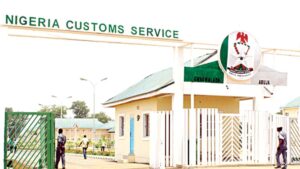The much-expected signing of contract for the modernization of the operations of the Nigeria Customs Service (NCS) took place last week, with promises to increase the revenue collectable by the service.

According to all the parties, it offers opportunity for Nigeria to earn as much as $176bn within the 20 years that the agreement will be in place.
The concession agreement itself is worth $3.2bn. The e-Customs concession agreement is between the trio of Nigeria Customs Service, Africa Finance Corporation (AFC) and China’s Huawei Technologies Limited.
An obviously elated Customs Comptroller-General, retired Col. Hameed Ali assured that the concession project would ease the cost of doing business, boost revenue, enhance productivity and stop arbitrariness in the service.
We recall that the controversial concession deal was first mooted in 2019, when the federal government approved that a consortium of four firms will handle a 20-year concession project, with the Nigeria Customs Service (NCS) and the Infrastructure Concession Regulatory Commission (ICRC).
And after lull, occasioned by stiff opposition from concerned stakeholders, the Federal Executive Council (FEC) at its September 2, 2020 meeting finally ratified the Customs modernisation contract, finally estimated to cost about $3.2billion.
Customs modernization efforts actually predate the current project; it started with the introduction of the Nigeria Customs Information System (NICIS) in 2014, and by 2017, the Service stepped-up to NICIS II.
Apart from the above, the modernization efforts and the use of IT has made it possible to integrate other government agencies, such as the National Agency for Food, Drug Administration and Control (NAFDAC); National Drug Law Enforcement Agency (NDLEA), Standards Organisation of Nigeria (SON); among others, into Customs single network of information-sharing.
According to documents made available to this newspaper, the Customs modernisation or “E-Customs Project” as it is called is aimed at engendering the establishment of a digital/paperless customs administration.
While waiting for the actualization of the project, a few things are worth pondering over. The observations of stakeholders concerning the scheme can not be wished away. They pointed out that, the e-customs project should not mean that already existing IT platforms of the Nigeria Customs Service should be discarded. They pointed at the huge funds that have been committed to this.
On paper, the $3.2billion Customs mordernisation project should revolutionize customs operations from analogue (and person-to-person), to complete paper-less transactions.
It should actually mean that both the import and export processes will be made seamless. It should also engender greater accountability and block revenue leakages, which should also translate to higher revenue into government coffers.
And, just like the Acting Director-General of ICRC, Mr Michael Ohiani, described it, the project should be revolutionary, leading to a new era of digital smart proceses and procedures for customs operations.
Read Also: Do you believe in the E-Customs?
There are some loopholes in the contract, which need explanation. The $3.2billion investment being provided by the consortium led by the AFC is said to be broken down into capital investment of $1.2 billion, which will be done in three phases over 36 months by the investors. Nigeria’s projection of the operational cost over the 20-year period of the implementation of the project is said to be $1.1 billion. This calculation is clearly ambiguous.
In like manner, what is the schedule of amortization of the private sector investment in this project? We are told that the consortium of investors and the government have a schedule that is negotiated for return on their investments including their profits and cost. Remember that, the $3.2 billion is being financed by the Africa Finance Corporation (AFC) and managed by Huawei Technologies Limited under a 20-year concession window.
Another question that is pertinent is, what becomes of the IT infrastructures that the Nigeria Customs Service already has and which are being put to use currently.
By its own admission, the Federal Government (through the Minister of Finance) says that, the Customs currently has some of its functions and duties automated, and that; the modernization project is only, “an end-to-end automation of all of Nigeria’s Customs Service processes”.
Finally, we are in support of any modernization efforts that will remove human contact from port operations and customs transactions paperless. This is because, customs operations at the nation’s entry points, be it air, sea or land are nothing to write home about.
Kindly like us on Facebook















